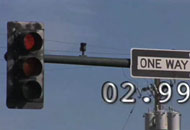4/1/2008
Denver, Colorado Caught Exploiting Short Yellow LightsDenver, Colorado chooses locations with short yellows and high volume to install red light cameras.

Denver, Colorado was caught this week attempting to add red light cameras at intersections with short yellow times. Rocky Mountain News reporters videotaped the city's four proposed ticketing locations and discovered that each had a yellow signal time set at 3.0 seconds -- a figure below recommended standards.
A 2005 Texas Transportation Institute study confirmed that yellows shorter than the bare minimum recommended amount cause an increase in both accidents and red light violations. A confidential memorandum obtained from a 2001 court trial in San Diego, California showed that the private vendor in charge of the photo ticketing program take advantage of that increase in the number of violations, as most companies are compensated on a per-ticket basis. For this reason, the company chose to install cameras only at intersections with high volume and Amber (yellow) phase less than 4 seconds."
Denver is following San Diego's pattern. At the intersection of 6th Avenue Freeway and Kalamath Street, one of the busiest in the city, the yellow warning time is a mere 3.02 seconds -- the absolute minimum allowed under federal regulations. The city's own standards show it should be at least 3.6 seconds. Under the 1976 Institute of Transportation Engineers (ITE) formula it should be 4.5 seconds, or more, because of particular visibility issues at the location. The Rocky Mountain News videotape shows clearly how an extra 1.5 seconds would eliminate the problem of red light entry at the intersection.
In the early 90s, however, the ITE changed its formula to reduce yellow times as red light cameras were being introduced into the United States. The Office of former US House Majority Leader Dick Armey argued in 2001 that cities used cameras to exploit the intersections mistimed as a result of the new, shorter formula. (view report)
"Red light cameras present a perverse disincentive for local jurisdictions to fix intersections with excessive red light entries," the majority leader's report explained. It's hard to fix a 'problem' that brings in millions in revenue."
Denver's city engineer promised to "review" the city's yellow timing policy. In nearby Fort Collins, the installation of a red light camera at College Avenue and Drake Road did nothing but increase the accident rate by 45 percent. Immediately after increasing the yellow light duration by one second, violations plunged and the accident rate dropped 30 percent -- from 2.8 to 2.0 accidents per million vehicle entries.


